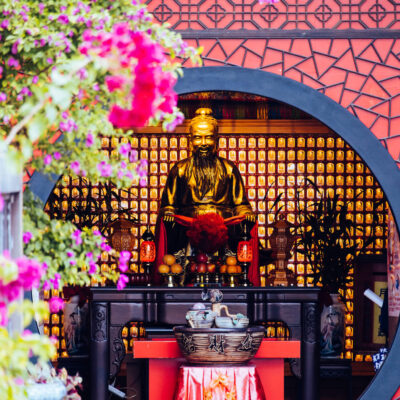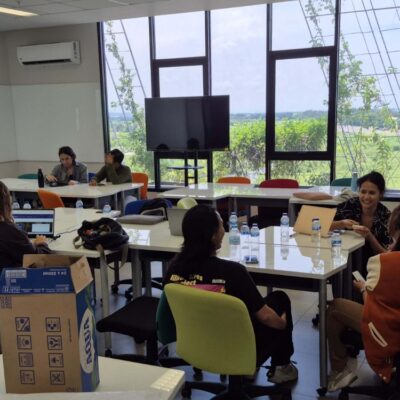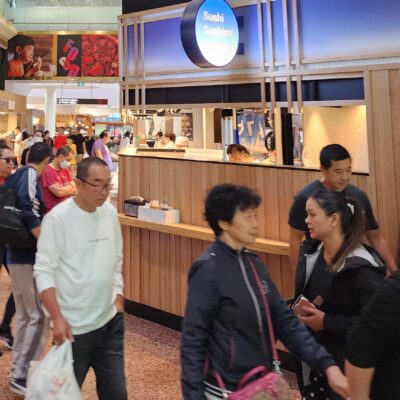Dr. Hoo Tiang Boon is Assistant Professor with the China Programme and Coordinator of the Masters in Asian Studies programme at the S. Rajaratnam School of International Studies, Nanyang Technological University.
In this interview with Melbourne Asia Review’s Managing Editor, Cathy Harper, he analyses the language and behaviour of China and the US and the implications of COVID-19 for the international global order.
How would you describe the language that is being used publicly by China and the US in relation to COVID-19?
For China, I would describe its COVID-19 rhetoric as defensive and nationalistic, yet normal. Such assertive language from Chinese officials predates the COVID-19 situation, and is increasingly becoming the “new normal” in terms of the language and tone that emanate from Beijing, particularly in the Xi [Jinping] era. You will find similar assertive rhetoric when it comes to perceived transgressions on Chinese interests, especially what Beijing deems to be its “core interests” (i.e. Taiwan, Tibet, Hong Kong).
The term “wolf warrior diplomacy”—inspired by China’s nationalistic hit movie Wolf Warrior (which is like a Chinese version of Rambo)—is being used to characterise China’s brand of diplomacy today.
Why is China behaving in this way?
This is complex and I don’t think it can be explained by any single factor. At a certain level, the officials are expressing China’s anger and indignancy at what they believe to be unfair accusations or perceived slights of Chinese national pride.
There is reportedly a “tsunami of anger” toward the US among Chinese elites, who had believed that things might become better after the US-China “phase one” trade deal, and that China had made significant concessions in response to American demands that were “unreasonable” in the first place. There is now apparent talk in China that Beijing should walk away from the “phase one” deal because it has not altered American behaviour and there is little incentive for China to continue to cooperate with the US. In fact, hawkish Chinese commentators argue that if China does not stand up for itself more, it will get “bullied” even more by the US.
This sort of thinking—which I describe as a victim-hood complex—is actually prevalent among the Chinese, both the political class and masses. This connects to China’s traumatic experiences in its so-called “Century of Humiliation” in the 19th and early 20th century when it was severely challenged by foreign imperialism. The victim-hood complex continues to be alive today and manifests itself in different ways, in part because these experiences are ingrained in national education, media and official discourse.
At the same time, China’s economic achievements and basic identity as a great power (which exists in some tension with its victim complex) have made the Chinese, particularly the elites, more confident in their country’s direction and political model. So Chinese officials become indignant and defensive when China is being blamed by the US for the COVID-19 pandemic. In their minds, they probably believe that China should be commended, if not emulated in its ways, after being relatively successful in containing the COVID-19 crisis.
Who are the Chinese diplomats speaking to?
At a bureaucratic level, I don’t think they are speaking to Xi per se, since he is so high up in the political hierarchy that I doubt he cares too much what his diplomats say. But Xi has created a political culture in which it becomes difficult for careerist officials to advance if they are not seen to be acting in a way that aligns with the more assertive and “proactive” China—its great power profile—that Xi is keen to present. His signature policy of the Belt-and-Road Initiative is emblematic of the kind of successful China that he wants the world to see. The fact that such “wolf warrior” diplomacy continues to be the norm suggests that this sort of language and behavior has the tacit approval of the top leadership.
How would you assess Washington’s language?
Its language has been described as “irrational”, “irresponsible” or “erratic”, but we should not be surprised by this sort of language from the Trump administration which has become par-for-the-course for the Trump White House and a president who makes policy through Twitter.
America’s COVID-19 rhetoric is entirely consistent with the unprecedented way that Trump has tried to fashion his presidency, which is both a function of his personal style and beliefs; and the intense politicisation of American foreign policy-making in the US. By that, I refer to his clear penchant to speak to, or mobilise, his base in terms of the ideas that animate his policy-making.
In essence, there is a clear disjuncture in terms of the perceptions and beliefs between both sides (China and the US), not only in the COVID-19 issue, but also many other consequential issues. COVID-19 is just the latest exemplification of the structural and ideational problems that have brewing between the two for quite a while, transcending the Trump administration. The Trump administration’s policies, as well as China’s direction under Xi, have only served to exacerbate and accelerate the trends that feed this ongoing rivalry.
Are both nations only interested in competitive power? Can you speak a little more about their respective aims?
For the US, its key strategic aims are relatively straight forward and two-fold: One, the main goal is to maintain American primacy in the world. It is not China per se that is problematic, it is the idea of a rising China that can potentially displace US pre-eminence that is problematic. In the 1980s, despite the fact that Japan is an ally, there were American perceptions of the “Japan threat”. And those were the days when American politics were saner! Today, there is a clear sense among American elites—particularly after the US’ pull-back from Iraq and Afghanistan and its so-called “terror fatigue”—that China represents the closest challenger to US global dominance. This strategic challenge is made worse by the fact China is being steered by a communist party that many Americans have an instinctive revulsion for.
The second goal of the US is that it wants to ensure the continuity of a US-centric global order and its norms. Hence it considers China (and Russia) to be “revisionist” powers, to the extent that these powers, their ways and beliefs are seen to be detrimental, if not an outright threat, to the kind of liberal democratic order that the US believes will make the world a better place. Ironically, under Trump and its populist “America First” approach, the US is now undermining the very ideas that underpin its own extant order.
For Xi’s more ambitious China, its stated goal is the “great rejuvenation of the Chinese nation”. The exact meaning of this is still being debated. For example, does “rejuvenation” mean the return of Taiwan? But its broad meaning is the idea of a China that returns to its former centrality and pre-eminence in Asia before the “century of humiliation”.
I don’t think China wants to displace the US in the world per se—such a strategic goal has never been mentioned in Chinese writings—but I do think it hopes to reduce US influence, if not push the Americans entirely away from the region. Chinese commentators are wont to argue that just as China does not interfere in America’s sphere of influence in the American continent, neither should the US be interfering in China’s backyard of Asia. Having said that, if the strategic circumstances allow, China will not reject the idea of a Pax-Sinica. China doesn’t specifically aspire to replace the US but if a power transition (as the international relations literature calls it) does happen in the future, my suspicion is that it will take it.
Do you think either nation is showing any kind of moral leadership in relation to their handling of the COVID-19 pandemic?
How China would act as a leader of the global order is another big question. Morality and politics are not necessarily separated in international relations. For many in the US, the fact that China is ruled by a communist regime that suppresses the liberty of its people means that it is difficult to accept that Beijing is capable of “moral” leadership.
Setting the ideological dimension aside, I see only limited global leadership from China in the current COVID-19 pandemic. So far, China’s health diplomacy—which can be briefly defined as diplomacy taken by a state to improve the health of others outside its boundaries—has primarily been exercised in bilateral terms, as opposed to leading a coordinated global effort. It has contributed masks, ventilators, PPEs [personal protective equipment] (both donations and heightened sales) to countries that are in need of these critical medical supplies.
But diplomacy is more than just action. It is also about narratives and perceptions. Here, its good efforts in contributing critical supplies is being undermined by some of the narratives coming out from Beijing that appear to champion or celebrate the superiority of China’s top-down political model in addressing COVID-19, which for many in the US is being perceived, rightly or wrongly, as unnecessarily insensitive and triumphalist in tone.
This is compounded by the fact that many Americans already psychologically assign at least partial blame to the Chinese Communist Party (CCP) for its initial management of the crisis, its less-than-transparent approach, as well as the unfortunate reality that the first known cases of the COVID-19 virus came from Wuhan.
For the Trump administration, it has been preoccupied with fighting America’s own internal COVID-19 fires; fighting the Democrats on US responses; and assigning blame to China. The upshot is that there has been virtually zero, or next to none, global leadership exhibited by the US. Blaming China for the COVID-19 crisis has become a bipartisan exercise, where it is now politically precarious for any US politician to be seen as “soft” on Beijing, particularly in the US election season.
There are also strategic concerns in the US and elsewhere that China could leverage on the COVID-19 crisis—because it is the leading producer of medical supplies and/or dominate the medical supply chains—to extend its influence internationally, if not bilaterally over certain countries.
Will the international world order be altered by COVID-19 and how?
I agree with Kevin Rudd, the former Australian prime minister, that both powers are “likely to emerge from the crisis significantly diminished.”
There have been, in my view, several reactionary assessments about a “post-COVID-19 world”. It is true there will be massive economic and health repercussions, but I don’t think the global order will be fundamentally altered by COVID-19, because these global shifts—toward a world which is more polarised, more tribal, less globalist, and with multiple political centers—have already been happening for some time, certainly before COVID-19.
The exact origins of these shifts are still being debated: whether it started from the 2008-2009 global financial crisis, Xi’s steering of China since 2013, or Trump’s rise to American presidency in 2017. But the more important observation is that COVID-19 has accelerated these shifts and exacerbated existing global fault lines.
What will Australia’s place be?
We are moving into a messier and more equivocal world where there will be much less “traffic control” from the US or the other major powers.
This means that middle or regional powers like Australia must step up more to the plate and show international leadership. And it’s best that this international leadership be exercised through existing multilateral platforms, because not only would a multilateral form of leadership have greater legitimacy, it would also help strengthen the institutionalisation of global decision-making.
In my view, the Morrison government’s push for an international and collaborative effort to investigate the origins of COVID-19 is an example of this kind of international leadership. So far, the [Scott] Morrison government has attempted to position itself as a neutral actor: it has refuted American “lab virus” theory and tried to push for an international inquiry. I doubt China will necessarily see Australia as a neutral player because of its alliance with the US as well as growing Sino-Australian strategic distrust. But an attempt by Canberra to position itself as such and resist the more extremist American impulses, would be a step in the right direction.
This interview has been edited for clarity and length.
Image: President Trump and First Lady Melania Trump, joined by President Xi Jinping and First Lady Peng Liyuan, in Beijing, 2017. Credit: Official White House Photo/Shealah Craighead.




